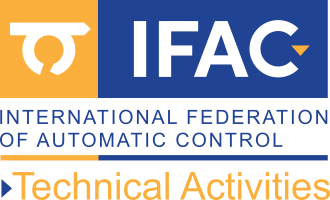Online Seminar Series for IFAC TC 1.2 Adaptive & Learning Systems
The main objectives of our "Online Seminar Series for IFAC TC 1.2 Adaptive & Learning Systems" are:
• Promote the latest research results in the field of Adaptive and Learning Systems;
• Create a forum for high-quality discussion of both theoretical and practical perspectives;
• Reach and engage the researchers and practitioners in our community worldwide;
• Provide a platform for the young generation to network with the rest of the world.
Organization of the Seminar Series:
We plan to run the online seminar series on a monthly basis. We will invite speakers at different career stages, both within and outside of the TC, to share their research with the community. To encourage and train the young generation, e.g., PhD students. We will also organise special events within the seminars series to provide a venue for them to share and discuss their research with their peers and experts in the community.
The seminar will be open to all researchers and practitioners across the world. It will be scheduled at a suitable time (in the afternoon, UTC time) to maximise the possible attendance. The lectures will be recorded and hosted on IFAC YouTube Channel (upon the permissions of the speakers and approval of IFAC).
Details of Next Seminar:
The next webinar in this series will be given by Professor Maria Prandini, Politecnico di Milano, Italy.
Title: Data privacy in multi-agent optimization under uncertainty
Time: February 12, 2026 (04:00pm CET)
Abstract: We consider multi-agent optimization problems over networks, where agents cooperate to reach agreement on a common decision or on the share of a common resource. We investigate the setting where the environment within which agents operate is uncertain, each agent has access to a finite amount of data on the uncertain phenomenon, and these data constitute a private resource that is not to be exchanged or shared among agents. We provide a data driven framework to address these problems, and show how to accompany decisions in such a private-data regime with probabilistic certificates of robustness using tools from the so called scenario approach. Moreover, we discuss how such decisions can be computed in a distributed manner. To this end, we presented a general distributed architecture as a multi-agent information exchange mechanism, and illustrated it by outlining specific algorithms to solve decision and constraint couple optimization problems. This is a joint work with Kostas Margellos (University of Oxford, UK), Alessandro Falsone and Simone Garatti (Politecnico di Milano, Italy).
To join the seminar, you may use the meeting link below:
Join Teams Meeting
https://msteams.link/CXCT
Meeting ID: 337 953 342 961 54
Passcode: 7mq3Tt2X
We will open the meeting 15 minutes earlier. The participants must join earlier - 10 minutes before the start. It will take some time to let them all in :-)
All of you are welcome! See you there!
Tiago Roux Oliveira (Chair of the TC 1.2: Adaptive and Learning Systems)
Bing Chu (Vice-Chair for Social Media of the TC 1.2: Adaptive and Learning Systems)
Past Webinars:
- Professor Eric Rogers, University of Southampton, UK.
- Title: Iterative Learning and Repetitive Control — A Status Report
- Time: November 26, 2025 (03:00pm GMT)
- Video: https://youtu.be/jtOL1RxsG9E?
- Professor Warren Dixon from University of Florida, USA.
- Title: Real-time Lyapunov-based deep learning for autonomous systems
- Time: November 10, 2025 (12:00pm EST)
- Video: https://youtu.be/IxqaEF9N5tE?
- Professor Anders Rantzer from Lund University (LTH), Sweden.
- Title: Optimal and Dual Control for Large-scale Systems
- Time: October 29, 2025 (04:00pm CET)
- Video: https://youtu.be/FTZVeE5Q9S0
- Professor Alexander Fradkov from SPbU, Russia.
- Title: Speed-Gradient for Modeling, Control, Adaptation and Learning
- Time: October 08, 2025 (02:00pm UTC)
- Video: https://youtu.be/bt4_nqaJL4k
- Professor Florian Dörfler from ETH Zurich.
- Title: Direct Adaptive Learning of the LQR
- Time: May 02, 2024 (05:00pm CET)
- Video: https://youtu.be/RMT-IbHgjBQ
- Professor Anuradha Annaswamy from MIT, USA.
- Title: The role of adaptation in learning, safety, and optimality
- Time: April 25, 2024 (09:30am ET)
- Video: https://youtu.be/uqjcOpKQYa8
- Professor Romeo Ortega, Instituto Tecnológico Autónomo de México.
- Title: New Robust Parameter Estimators and Systems Reparameterizations: Dealing with Lack of Excitation and Nonlinear Parameterizations
- Time: September 26, 2023 (11am CDT, 4pm UTC)
- Video: https://youtu.be/N3qfiakYsCI
- Professor Denis Dochain, Université catholique de Louvain.
- Title: Automatic Control and Biological Systems: a long quiet river?
- Time: April 12, 2023 (9am CDT, 2pm UTC)
- Video: https://youtu.be/VZ5y7HckfeM
- Professor Na Li, Harvard University, Cambridge.
- Title: Scalable Distributed Control and Learning of Networked Dynamical Systems
- Time: February 15, 2023 (7am PST, 9am CDT, 3pm UTC)
- Video: https://youtu.be/sGOzBUWTcBk
- Professor Magnus Egerstedt, University of California, Irvine.
- Title: Constraint-Based Control Design for Assured and Long-Duration Autonomy
- Time: January 11, 2023 (9am PST, 11am CDT, 5pm UTC)
- Video: https://youtu.be/ATqcna2YoDg
- Professor John Ringwood, Maynooth University.
- Title: Energy maximising control for wave energy systems: an extremum seeking problem?
- Time: December 19, 2022 (4pm UTC)
- Video: https://youtu.be/vQCyfawXVog
- Professor Martin Guay, Queen’s University.
- Title: Data driven control of unknown nonlinear systems using extremum seeking control
- Time: May 27, 2022 (8am PST, 10am CDT, 3pm UTC)
- Video: https://youtu.be/MMr8M9JpGD8
- Professor Tamer Basar, University of Illinois Urbana-Champaign.
- Title: Policy Optimization for Optimal Control with Guarantees of Robustness
- Time: April 27, 2022 (8am PST, 10am CDT, 3pm UTC)
- Video: https://youtu.be/7sjv24wNyBA
- Professor Miroslav Krstic, University of California, San Diego.
- Title: The Magical Worlds of Adaptive Stabilization and Optimization
- Time: March 14, 2022 (8am Pacific Daylight Time, 3pm Universal Time UTC)
- Video: https://youtu.be/X_N-0N22VZE
https://tc.ifac-control.org/1/2

